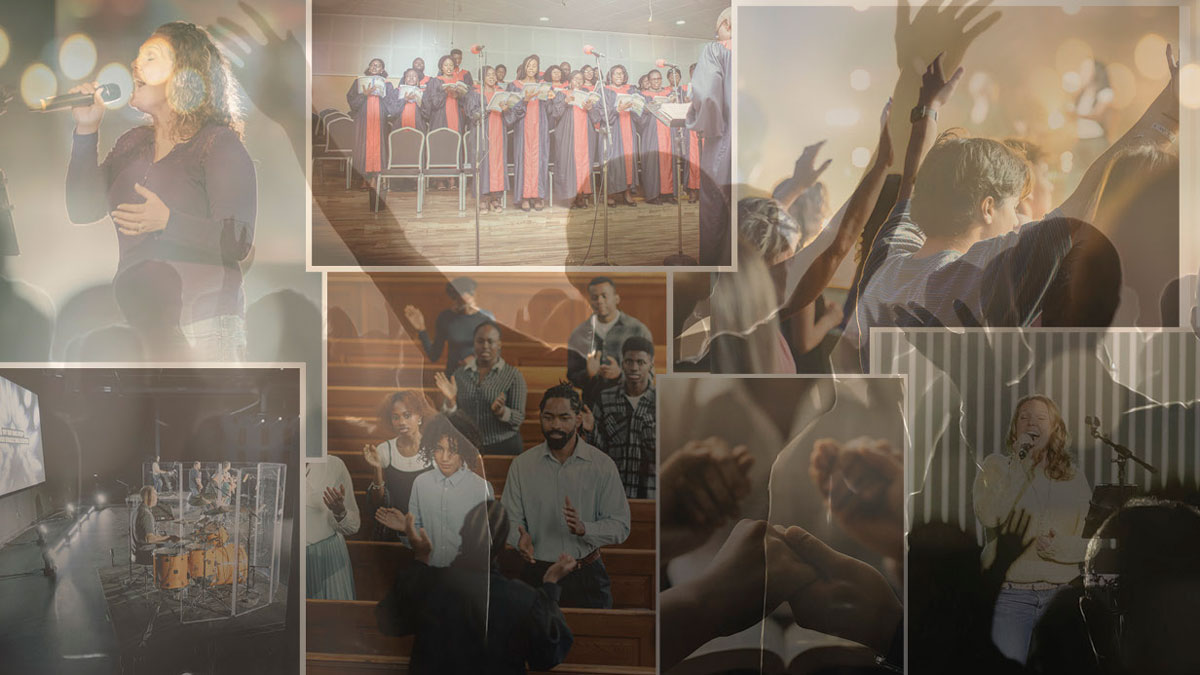When I was younger, the “Worship Wars” raged in our church. I grew up surrounded by arguments for and against contemporary music—some of them reasonable, some of them bordering on the absurd. One argument I heard was that one should only play music in 4/4 time, as anything else might disorder the body!1 It seems to me that we never found a solid, biblically-based resolution to the conflicts we endured as a church—the ultimate outcome was that churches split, some churches died because of it and we’ve agreed to disagree.
But what if there were biblical principles from a deeper reading of Scripture that we could apply to the way we present and respond to our expressions of praise? If we were to study God’s Word on the subject, we may find that God is perhaps more open-minded than we are when it comes to praise.
Firstly, we must define what worship is—and it’s much deeper than just the music we sing to or the way we sing to it. Romans 12:1 admonishes us to “present [our] bodies as a living sacrifice, holy and acceptable to God”, which Paul says is our “spiritual worship” (ESV). We must understand that any beauty or power in the music we sing is only as strong as our connection to Christ. Neither the church organ nor the modern worship band are acceptable to God if those who present it are harbouring cherished sin or pride or hiding Jesus’ love from those around them.
The Bible shows that the Hebrews expressed their praise to God in many ways—and we may find that they were much more expressive than we might feel comfortable being:
- Hallah, which we may recognise from the word “Hallelujah”, means to praise—but to the point of excess or foolishness.
- Yadah means to declare God’s goodness while raising one’s hands—and it should be noted that this was a common practice at the time for both God’s people and pagans alike.2
- Todah means to raise one’s hands and shout praise in expectation that God will come through for His people.
- Shabach means to rejoice loudly, and it did not always involve words.
Now I am not suggesting that these are prescriptive—if these seem excessive, God will still accept our praise even if we don’t worship exactly like this. I, for one, would feel uncomfortable shouting in church. But there is definitely a place for us to be more expressive—if our expression is dedicated to God’s glory rather than our own enjoyment. It should be noted, however, that seeking God’s glory is, and should be, the most enjoyable thing we do as humans.
Much has been made of David’s dancing before the Ark of the Covenant in 2 Samuel 6, and it is often used as proof that dancing that is dedicated to God is acceptable. But the passage asks much more of us than that. In David’s time, kings who were defeated in battle were made to humiliate themselves by dancing in victory parades. David’s dancing in procession in front of the Ark would have been seen as giving up all his dignity to show his surrender to God. How many of us can truthfully say that we’ve done the same in our praise?
Another verse that we often look to for guidance is Paul’s exhortation in Ephesians 5:19 for the believers to sing “psalms, hymns and spiritual songs”. Now the psalms he was referring to were the same ones we have today in our Bibles, but the hymns were something completely new to Jewish believers. The hymn genre itself actually began as pagan songs of praise, and no doubt the pagans coming into the church sought to direct their praise to the only God in the manner which came most naturally to them. Paul isn’t scared of this—as long as God alone is being glorified, genre doesn’t matter to Him.
The encouragement to sing spiritual songs, however, is one that we should pay close attention to. These songs were spontaneous, unstructured and only able to be sung by those who had experienced what they were singing about. In the same way, we should aim to sing songs about the way that God has led in our lives, as well as to look for ways in which the songs we sing are monuments to God’s intercession.
From looking at the way in which praise was expressed in the Bible, we can see that the faithful believers who came before us drew from a wide and eclectic mix of musical influences, some of them even from sources in the world around them that today we might consider questionable. It seems that it is the dedication to God, both in the words and in the heart, that makes praise music acceptable, rather than the influences that formed it. God’s people have always been breaking new ground musically and praising in ways inspired by, and in response to, their culture.
So how might we be more faithful in our expression of praise? We should firstly be guided by giving everything we do as a sacrifice to God. For myself, I try to incorporate praise music into my everyday routine as often as possible. In addition, it is healing for us to choose to praise when we feel overwhelmed, when we have conflict with others and when we face challenges that we don’t feel ready for.
Given the vast array of praise music available to the modern church, however, it is safe to say that there is far more than any of us could reasonably listen to in a lifetime. Because of this, we should choose songs for our personal and community worship that best exalt who God is, and the things that He has done in the history of His people. Some glimpse of the gospel should be evident in every song that we make space for. And many of the older songs we’ve sung are monuments to God’s faithfulness in the lives of our communities and our Church.
Sometimes a new song or instrument that is introduced might not sit right with us. There is a place for discernment about the influences around us. But let us not use the phrase “It’s not biblical” when we actually mean “I personally feel uncomfortable with it”. And let us not be content to copy wholesale how praise music has been presented in other churches. Just like the early Church, we are called to present something that takes from the influences around us, but that expresses God’s working in our Church in a way that most faithfully expresses our Adventist identity and mission.
And this is something that I personally pray for. In every church revival throughout history, a host of composers and musicians have encapsulated precious biblical truth in song. When the time comes, may we also be ready to “sing a new song unto the Lord” for the world to hear.
- The human heart beats in 3/4 or 6/8, and hymns like “Come Thou Fount” and “The Old Rugged Cross” are in 3/4 and 9/4 respectively, so make of that argument what you will.
- This act is known as the “orans posture”, and has been a tradition of Middle Eastern cultures for millennia.
Mitchell Strahan is a teacher at Darling Downs Adventist College, Queensland.






